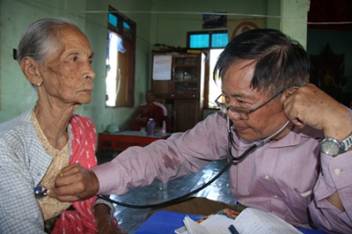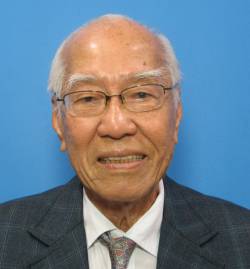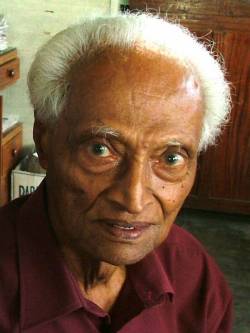 A large sign on way out of Yangon’s airport has lost its “l”. It now says “We come to Yangon”. Indeed we do.
A large sign on way out of Yangon’s airport has lost its “l”. It now says “We come to Yangon”. Indeed we do.
Over 150 people who work for or represent older people and their issues have come to Myanmar to discuss rapid ageing in this region and how care services need to be radically reformed to meet the needs of older populations.
Back working for HelpAge this coming week means I’ve already got my age lens back on. The first ad I spot is on the back of a bus – a picture of a smiling toothless older man holding a fried chicken leg. The slogan says “Wellness in your 60s? Drink what you cannot eat”. I’m not sure if they are advocating he liquidise the chicken leg. I’m hoping it’s an ad for a vitamin drink.
The theme of this conference isn’t just ageing, but rapid ageing. HelpAge often use the projection that by 2050, 20% of the world’s population will be over 60. However, here in South East Asia, numbers of older people will have already reached an all-time high by 2020-2030. Dr John Beard of the Department of Ageing and Lifecourse at the World Health Organization highlighted this by saying that France had 100 years to adjust to an ageing population. Countries such as Myanmar, Korea, Vietnam, and China have just 20 years to prepare. One sector urgently in need of reform to prepare for this change is care.
Care is in the shadows
Richard Blewitt, Chief Executive of HelpAge says that “care is in the shadows” when it comes to international development. It doesn’t appear on any development agenda and few donors  address it. Longevity has been an aspiration in human development for decades. Yet now that we have it, we don’t seem to want to address its consequences.
address it. Longevity has been an aspiration in human development for decades. Yet now that we have it, we don’t seem to want to address its consequences.
This HelpAge conference, as always, is not just an international gathering of professional experts in ageing. It brings together the real experts: older people.
The oldest delegate here is Dr Datuk Lum Kin Tuck from Malaysia who is 95 (right). He says: “My organisation (the National Council of Senior Citizens Organisations) has to fight very hard with the government to get services for older people. Because I’m an old man with a big voice, the Prime Minister listens to me!
“If you want your government to do something for you, you have to organise yourselves. Look at me. I’m old but I’m vocal, and people listen!”
Older people not just passive recipients of care
Dr Daw Myint Myin Khin, of the Myanmar Medical Association who is in her 80s, summarised points raised by older delegates: “We must pressure governments to take more responsibility for care, particularly for the poorest old. However, reliance on government services alone is not the solution – we also need community services, including developing informal networks of neighbours and volunteers. Also, older people are not just passive recipients of care; we can also deliver services to our fellow older people.”
For the first time in the region, many older people live alone and not with their families. In Indonesia, for example, 40% of older people live with their families. Back in 1993, it was 65%. Participants discussed the pros and cons. Though older people value their independence, there are significant challenges as people move to the later stages of old age.
“Elders of the world unite; you have nothing to lose but your pains!”
Bala Tampoe, 64,  has worked for the Ceylon Mercantile, Industrial and General Workers Union in Sri Lanka for over 64 years. He says: “Most workers in our country care for older people. My union demands a living wage for an eight hour working day, because we want workers to have a balance and be able to care for their families.
has worked for the Ceylon Mercantile, Industrial and General Workers Union in Sri Lanka for over 64 years. He says: “Most workers in our country care for older people. My union demands a living wage for an eight hour working day, because we want workers to have a balance and be able to care for their families.
“How can a garment worker care for older people and children if they work 10, 12, 16 hours a day in a factory? Their salaries are too low to pay for a carer.
“I have worked for a union all my life and lived by Karl Marx’s famous quote. I have slightly altered it and now say: ‘Elders of the world unite; you have nothing to lose but your pains!’ I have lived so long because I keep learning. My secret to healthy ageing is looking after other people.”
- Read more on our work supporting older people throughout East Asia
- Follow progress from the conference by following Rosaleen on Twitter @rosaleenindo
